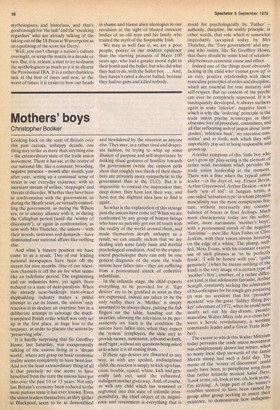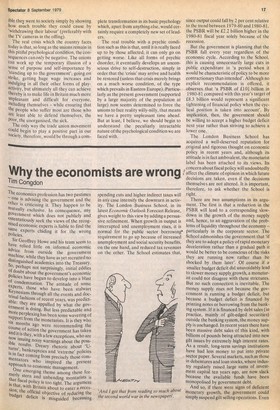Mothers' boys
Christopher Booker
Looking back on the state of Britain over this past curious, unhappy decade, one thing may strike us more than anything else — the extraordinary state of the trade union movement. There it has sat, at the centre of our national life, like a constant, brooding, negative presence — month after month, year after year, setting up a continual sense of strain in our everyday existence, with an incessant stream of strikes, 'stoppages' and threats of disorder. Whether they have been in confrontation with the government, as during the Heath years, or virtually controlling the government, as during the Wilson era, or in uneasy alliance with it, as during the Callaghan period (until the 'winter of discontent'), or again in confrontation, as now with Mrs Thatcher, the unions — with their moods, tantrums and demands — have dominated our national affairs like nothing else.
And what bizarre position we have come to as a result. Two of our leading national newspapers have been off the streets for nine months. One of our television channels is off the air for what seems like an indefinite period. The engineering and car industries have, yet again, been reduced to a state of near-paralysis. When the already near-bankrupt state-owned shipbuilding industry makes a pitiful attempt to cut its losses, the unions' only reaction is to declare an overtime ban in a deliberate attempt to sabotage the muchtrumpeted Polish order which was only set up in the first place, at huge loss to the taxpayer, in order to placate the unions by 'preserving jobs'.
It is hardly surprising that Sir Geoffrey Howe, last Saturday, was exasperatedly talking of the unions living in a 'dream world', where any grasp on basic economic reality seems completely to have been lost. And not the least extraordinary thing of all is that precisely no one seems to have benefited from the state the unions have got into over the past 10 or 15 years. Not only has Britain's economy been reduced to the most parlous state it has ever known. Even the union leaders themselves, as they gather at Blackpool, seem to be as demoralised and bewildered by the situation as anyone else. They may, in a rather tired and desperate fashion, be trying to whip up some illusion of purpose and self-importance by making ritual gestures of hostility towards the government (while the opinion polls show that roughly two thirds of their members are privately more sympathetic to the government than to the TUC). But it is impossible to conceal the impression that, deep down, they have lost their way, and have not the slightest idea how to find it again.
So what is the explanation of this strange pass the unions have come to? When we are confronted by any group of human beings who have so patently got out of touch with the reality of the world around them, and made themselves deeply unhappy as a• result, we can usually reckon that we are dealing with some fairly basic and morbid psychological condition. And to the experienced psychologist there can only be one general diagnosis of the state the trade unions have fallen into — they are suffering from a pronounced attack of collective infantilism.
In the infantile stage, the child expects everything to be provided for it. 'Ego desires' are to be gratified as soon as they are expressed, indeed are taken to be the only reality there is. 'Mother' is simply assumed to be always there, putting the fish fingers on the table, handing out the sweeties, allowing the television to be permanently on. Such is the condition the unions have fallen into, when they expect the 'system' (employers, the state etc) to provide money, sustenance, jobs and so forth, as of 'right', without any questions being asked as to where it is all coming from.
If these ego-desires are thwarted in any way, as with any spoiled, undisciplined child, the reaction is simply to kick up a fuss, cause trouble, squeal, whine, kick and generally lash out, until the exhausted, indulgent mother gives way. And, of course, as with any child which has remained or regressed into this state of infantile irresponsibility, the chief object of its impatience and resentment is everything that is stood for psychologically by 'Father' — authority, discipline, the reality principle; in other words, that role which is somewhat improbably occupied today by Mrs Thatcher, the 'Tory government' and anyone who insists, like Sir Geoffrey Howe, that there should be some kind of relationship between economic cause and effect.
Indeed one of the things most obviously lacking in the child who 'cannot grow up' is an easy, positive relationship with these masculine principles of order and discipline, which are essential for true maturity and self-respect. But no content of the psyche can ever be completely repressed. If it is inadequately developed, it always surfaces again in some 'inferior', negative form — which is why the 'ordering' principle in the trade union psyche re-emerges in their obsessive love of procedure, committees, and all that suffocating web of jargon about 'composites', 'reference back', 'my executive committee' and so forth, with which they selfimportantly play-act at being responsible and grown-up.
Another symptom of this 'little boy who can't grow up' play-acting is the element of rather weak narcissism which pervades the trade union leadership at the moment. There was a time when the typical union leader — in the days of, say, Ernest Bevin, Arthur Greenwood, Arthur Deakin — was a burly 'son of toil': in Jungian terms, a one-sided 'sensation type' in whom physical masculinity was the most conspicuous feature, without necessarily any counterbalance of brains or finer feelings. Much more characteristic today are the softer, wilier, more narcissistic 'mother's boys', with a pronounced streak of the negative 'feminine' — men like Alan Fisher or Clive Jenkins, with their voices always hovering on the edge of a whine. The plump, wellfed, Moss Evans, with his constant evasive use of such phrases as 'to be perfectly frank', 'I will be honest with you', 'quite genuinely' (when he means nothing of the kind) is the very image of a certain type of 'mother's boy'; another, of a rather different kind, is that adolescent fantasist, Arthur Scargill, constantly seeking the admiration of his colleagues for his tough-guy posturing (it was no accident that his 'proudest moment' was the great `Saltley flying picket' adventure of 1972, when he could most nearly act out his day-dream, pseudo masculine Walter Mitty role as a cross between a heroic revolutionary, a wartime commando leader and a Great Train Rob ber). The extent to which this Walter Mittyism today pervades the trade union movement was conspicuously shown last winter, when so many local shop stewards of the Jamie Morris stamp had such a field day. The motto of the 'winter of discontent' could easily have been, to paraphrase song from that rather infantile musical Salad Days, 'Look at me, oh, look at me, oh, look at me, I'm siriking'. A large part of the winter's troubles seemed to have been caused by group after group seeking to assert their existence, to demonstrate how indispens ible they were to society simply by showing how much trouble they could cause by 'Withdrawing their labour' (preferably with the TV cameras in the offing).
The real crisis which the country faces today is that, so long as the unions remain in this pitiful psychological condition, the consequences can only be negative. The unions can work up the temporary illusion of a sense of purpose and self-importance by 'standing up to the government', going on ,trike, getting huge wage increases and indulging in all their other forms of playactivity, but ultimately all they can achieve thereby is to make life in Britain much more unpleasant and difficult for everyone, including themselves — while ensuring that the people who suffer most are those who are least able to defend themselves, the Poor, the unorganised, the sick. The only way the trade union movement could begin to play a positive part in our society, therefore, would be through a corn plete transformation in its basic psychology which, apart from anything else, would certainly require a completely new set of leaders.
The real trouble with a psychic condition such as this is that, until it is really faced up to by those affected, it can only go on getting worse. Like all forms of psychic disorder, it eventually develops an unconscious drive to self-destruction, simply in order that the 'crisis' may arrive and health be restored (unless that crisis merely brings on a much worse condition, of the type which prevails in Eastern Europe). Particularly as the present government (supported by a large majority of the population at large) now seems determined to force the unions to face reality willy-nilly, that means we have a pretty unpleasant time ahead. But at least, I believe, we should begin to understand the peculiarly intractable nature of the psychological condition we are faced with.



































 Previous page
Previous page